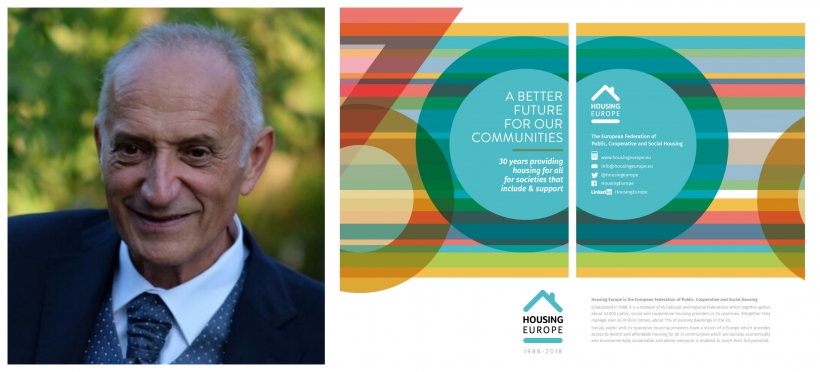Interview with Marco Corradi
Housing Europe turns 30
Brussels, 6 June 2018 | Published in Social
Marco Corradi has been involved in Housing Europe for more than two decades. Among other contributions, Marco has led from 2010 to 2014 the “Energy Expert Network”, the permanent working group within Cecodhas which is dedicated to the energy efficiency of buildings. Until present day, he is Member of the Board of Directors of Housing Europe representing Federcasa, while being President of ACER Reggio Emilia, a public housing company based in Reggio Emilia, Italy.
What does Housing Europe mean to you?
Housing Europe is a large community of men and women coming from different countries, territories and cultures, united by a common goal: sustainable housing for all. The members of Housing Europe believe in their social mission and together identify the best suitable solutions, improving the lives of millions of European citizens.
Housing Europe is a place for extraordinary comparison, collaboration and exchange of experiences that accelerates the ability to prevent and tackle challenges with a strong innovative drive.
What is your most vivid memory from your time at Housing Europe?
From a personal point of view, I had the opportunity to meet many people from different countries and I realized that the world is "smaller" than it seems. I appreciated the continuous introduction to ideas that makes you feel really part of a united community: Europe.
From a professional point of view, Housing Europe has been a great opportunity for growth, based on merit, skills, capacity continuously stimulated by debate.
Housing Europe is a laboratory where you have the opportunity to develop projects, actively participate, learn, compare and share.
What has been the most significant achievement of the organisation during your time?
Maintaining the unity of so many different associations and even growing over the years is, in my opinion, the first result achieved. Even inspite of of difficulties, we have been able to adapt to changes and present ourselves as a credible and innovative body in a historical period characterized by great contradictions.
Today, we are an important and competent reference point for our members and for the international institutions and associations. Housing Europe, thanks to its strong capacity for analysis, action and experimentation through projects, is a well respected interlocutor.
What is, in your view, the added value that Housing Europe brings to its members, to policy makers and to the academic world?
Housing Europe, through its members, has a direct connection with the ground, where the various communities are faced with a number of social issues, and tackles challenges in the general interest of citizens.
For this reason, over the years the organisation has invested heavily in analysis and research. In Housing Europe today, we are talking not only about social housing in general, but about integration, young people, the elderly, smart cities, smart buildings, smart communities, energy efficiency and urban regeneration, BIM and new services for living.
The "world of social housing" includes a variety of issues that Housing Europe addresses in their complexity through in-depth comparative analysis, supported by a strong capacity to identify solutions that can be applied effectively and even replicated at a later stage, at European, national, regional and local level.
How do you estimate that the role of the organisation will change in the course of the next 30 years?
There are many big changes currently unfolding and the unknowns are many... However, I am confident that Housing Europe is in position to maintain a leading role in international exchange, in promoting innovation, aimed at the well-being of European citizens.